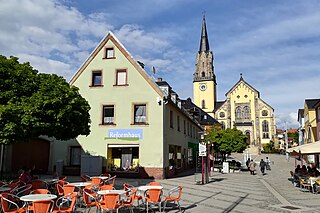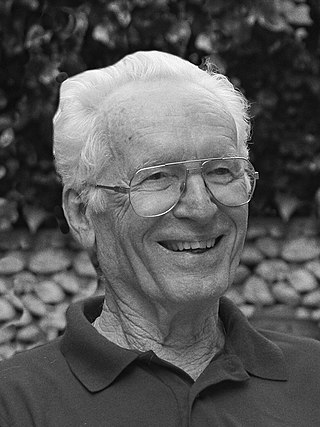
Selb is a town in the district of Wunsiedel, in Upper Franconia, Bavaria, Germany. It is situated in the Fichtel Mountains, on the border with the Czech Republic, 20 km northwest of Cheb and 23 km southeast of Hof.

Allach porcelain a.k.a. Porzellan Manufaktur Allach was produced in Germany between 1935 and 1945. After its first year of operation, the enterprise was run by the SS with forced labor provided by the Dachau concentration camp. The emphasis was on decorative ceramics —objets d'art for the Nazi regime. The company logo included stylized SS runes. Sometimes in place of the company name, the pottery markings mentioned the SS: "DES - WIRTSCHAFTS - VERWALTUNGSHAUPTAMTES". Ceramic artist, master potter and author Edmund de Waal describes the double-lightning insignia of the SS that marked the Allach products as a clever transposition of Germany's famed Meissen porcelain mark of two crossed swords.

Hassan Heshmat was a celebrated Egyptian sculptor, and is considered a pioneer of modern Egyptian art. Born January 20, 1920, in Menoufia, Egypt, Heshmat earned his diploma in Applied Arts, specialising in ceramics (1938), followed by a diploma from the Higher Institute of Technical Education for Teachers (1954). In 1957, he was granted a scholarship to study Porcelain Design in Selb, Bavaria, graduating in 1958. Hassan Heshmat is considered the first Egyptian artist to create works in porcelain, his sculptures reflect traditional, patriotic and emotional themes. His work has been exhibited widely, and is held in a number of collections and institutions all around the world. Heshmat has been awarded prestigious local and international prizes, winning silver and gold medals at the International Ceramics Competition in Italy in 1964 and 1965 as well as winning first prize in a competition to build a memorial monument for a church in Belgium in 1970. Heshmat was awarded a Certificate of Merit by the Egyptian Fine Arts Academy in 1980, as well as a Certificate of Appreciation from the Ministry of Culture in 1995, and was later awarded the Egyptian state's Appreciation Award.

Arzberg is a town in the district of Wunsiedel, in Bavaria, Germany. It is situated 13 km west of Cheb and 10 km northeast of Marktredwitz.

Arzberg is the trademark of a German manufacturer of porcelain, founded in 1887 in Arzberg, Bavaria. Its fame is largely based on designs by Hermann Gretsch, whose Form 1382, conceived in 1931 and based on Bauhaus principles, marks a milestone in modern design; Form 1382 is still produced today, and sold worldwide. Hutschenreuther AG, holder of the Arzberg trademark since 1972, was dissolved in 2000 and the trademark was taken over by SKV-Porzellan-Union GmbH, founded in 1993 by the porcelain companies Schirnding, Kronester and Johann Seltmann Vohenstrauß. In 2004, SKV-Porzellan-Union GmbH was renamed Arzberg-Porzellan GmbH. In 2003, the company had approximately 250 employees. Since 2000, however, the headquarters of the company holding the trademark Arzberg are located in Schirnding, where production took place. After 10 years Arzberg GmbH announced its insolvency. Today the trademark is owned by Rosenthal porcelain.

The Frankenthal Porcelain Factory was one of the greatest porcelain manufacturers of Germany and operated in Frankenthal in the Rhineland-Palatinate between 1755 and 1799. From the start they made hard-paste porcelain, and produced both figurines and dishware of very high quality, somewhat reflecting in style the French origin of the business, especially in their floral painting. Initially they were a private business, but from 1761 were owned by the local ruler, like most German porcelain factories of the period.

Lichte is a village and a former municipality in the district of Sonneberg in Thuringia, Germany, close to the Thuringian Rennsteig. Formerly in the district Saalfeld-Rudolstadt, it is part of the town Neuhaus am Rennweg since January 2019.

The Holenbrunn–Selb railway was a branch line in Bavaria in southern Germany. It opened on 25 October 1894 initially just between Selb-Plößberg to Selb Untere Stadt. At Selb Untere Stadt this Lokalbahn line branched from the Cheb–Oberkotzau railway that went to Asch and Franzensbad over the border. The railway continued, as a goods line only, to the Hutschenreuther porcelain factory at Ludwigsmühle.
The Cheb–Oberkotzau railway is a railway line in Bavaria, Germany, and the Czech Republic which was built as a main line. It begins in Cheb and runs via Františkovy Lázně, Aš and Selb to Oberkotzau. The line was originally planned as a direct railway link between Cheb and Hof; but the plan was changed so that the existing Ludwig South-North Railway between Oberkotzau and Hof was shared. The section Aš–Selb-Plößberg was closed during the Cold War, but rebuilt and reopened in 2015.

Wallendorfer Porzellan or Wallendorf Porcelain is a porcelain manufacturing company which has been in operation since 1764 in Lichte (Wallendorf) in the Thuringian Highlands. Wallendorf is one of the oldest porcelain trademarks in Germany and the whole of Europe.

The Porcelain factory Fraureuth Joint-stock company in Fraureuth was one of the biggest and best standard porcelain factories of the German Reich.

Carolus Magnus Hutschenreuther was a German industrialist and the founder of the C.M. Hutschenreuther Porcelain Factory in Hohenberg an der Eger, Bavaria.

Rosenthal GmbH is a German manufacturer of porcelain products and other household goods. The original firm was founded in 1879 in Selb, Bavaria. Since 2009, Rosenthal has been owned by the Italian company Sambonet Paderno Industrie.
Philipp Rosenthal was a German designer and industrialist of Jewish descent. Rosenthal founded the company Philipp Rosenthal & Co. AG in 1897 for the production of ceramic wares.

Philip Rosenthal was a German industrialist, socialite and Social Democratic Party politician. In 1950, Rosenthal regained control of the family's company Rosenthal AG after the fall of Nazi Germany. In 1968, Rosenthal was awarded the Bavarian Order of Merit and in 1981, the Order of Merit of the Federal Republic of Germany. From 1970 to 1971, he served as Germany's Parliamentary Secretary of State under the Ministry of Economic Affairs. Rosenthal was a public figure, and in addition to being Germany's "China King", he was often recognized for his eccentric lifestyle and personality.

The Porzellanikon is a museum complex dealing with the production of porcelain and ceramics in Selb and Hohenberg an der Eger in the district of Wunsiedel i. Fichtelgebirge (Oberfranken) in Germany. The complex of museums was the result of the merger of the European Industrial Museum for Porcelain, the European Museum of Technical Ceramics, the Rosenthal Museum and the German Porcelain Museum in Hohenberg an der Eger. Since 2012, the Porzellanikon has been included in the European Route of Ceramics as a member of the "UNIC".

Ludwigsburg porcelain is porcelain made at the Ludwigsburg Porcelain Manufactory founded by Charles Eugene, Duke of Württemberg, on 5 April 1758 by decree as the Herzoglich-ächte Porcelaine-Fabrique. It operated from the grounds of the Baroque Ludwigsburg Palace. After a first two decades that were artistically, but not financially, successful, the factory went into a slow decline and was closed in 1824. Much later a series of other companies used the Ludwigsburg name, but the last production was in 2010.

Josef Schmitt, later Ritter Josef Schmitt was a German Lawyer, Knight, and Privy Councilor. He was born in Bavaria to Ritter Josef von Schmitt, who was the advisor to Prince Luitpold of Bavaria and a privy councilor. Josef Schmitt was, in later life, Deputy Chairman of the Supervisory Board of SKF, the J. Mich AG in Bamberg, the AG Steinfels, formerly Hch. Knab in Steinfels, the H. Henniger Reifbräu AG in Erlangen and the Baumwollindustrie Erlangen-Bamberg AG in Erlangen. He was also a member of the supervisory boards of the AG für Licht- und Kraftversorgung in Munich, the Porzellanfabrik Kloster Veilsdorf AG , the porcelain manufacturer C. M. Hutschenreuther AG in Altrohlau and the Rizzibräu AG in Kulmbach. He was a member of the Bavarian State Committee of Deutsche Bank and Disconto-Gesellschaft and the Allianz and Stuttgarter Verein Versicherungs-AG, later Allianz.

Carolus is the medieval Latin form of the name Charles. It was the name of various Frankish rulers, most notably of Charlemagne (742–814).

Alexander Cvijanović was a Yugoslav-American architect. He was a close associate of Walter Gropius and partner of The Architects Collaborative.





















